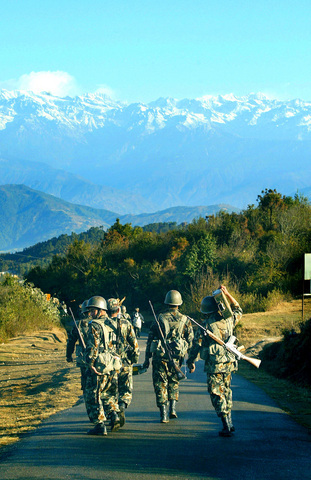Nepalese travelers hit the roads yesterday while food and other essential supplies began flowing freely into cities after communist rebels lifted a crippling two-week countrywide highway blockade to protest the king's power grab.
The rebels said Saturday that their decision was aimed at easing the discomfort of the common people. However, they threatened to step up their military campaign against the army.

PHOTO: AP
Fighting since 1996 to topple the monarchy and install communist rule, the insurgents blocked the country' highways using crude bombs, mines and boulders, disrupting basic supplies across the Himalayan kingdom and choking off major cities.
Yesterday, buses and cars that had been parked in garages for days ventured out onto the roads snaking through the mountainous country.
"We have had several telephone calls this morning from people who wanted to make reservations. Finally, it's business as usual," said Ram Shrestha, a ticket clerk at the local bus station in the capital, Kathmandu.
During the rebel blockade, vehicles piled up on the highways, waiting for security forces to clear explosives and escort civilian convoys to their destinations without being targeted by the insurgents. Prices of food and other essential items shot up across Nepal.
"We are lifting the indefinite blockade of transportation to show our deep responsibility toward the people," rebel chief Pushpa Kamal Dahal, also known as Prachanda, said in a statement late Saturday.
"We are going to start a new phase of movement increasing military resistance and mass movement of people," Dahal said without elaborating.
A Nepalese army spokesman declined comment.
The terror on the highways spiraled after indiscriminate firing by suspected rebels killed an Indian truck driver and wounded seven Nepalese last week.
Since then, airlines have been overwhelmed with bookings, even though only a tiny percentage of people in this impoverished country can afford air travel.
The insurgents said they were protesting King Gyanendra's decision on Feb. 1 to sack the government, impose emergency rule, and suspend civil liberties.
The monarch, who says he was forced to act because of the insurgency, has ignored repeated calls from the international community that he restore democracy.
Nepal's key allies, India and Britain, have suspended military aid and the US says it also is considering similar action. Several countries have withdrawn their ambassadors from Nepal and stopped aid.

PRECARIOUS RELATIONS: Commentators in Saudi Arabia accuse the UAE of growing too bold, backing forces at odds with Saudi interests in various conflicts A Saudi Arabian media campaign targeting the United Arab Emirates (UAE) has deepened the Gulf’s worst row in years, stoking fears of a damaging fall-out in the financial heart of the Middle East. Fiery accusations of rights abuses and betrayal have circulated for weeks in state-run and social media after a brief conflict in Yemen, where Saudi airstrikes quelled an offensive by UAE-backed separatists. The United Arab Emirates is “investing in chaos and supporting secessionists” from Libya to Yemen and the Horn of Africa, Saudi Arabia’s al-Ekhbariya TV charged in a report this week. Such invective has been unheard of

US President Donald Trump on Saturday warned Canada that if it concludes a trade deal with China, he would impose a 100 percent tariff on all goods coming over the border. Relations between the US and its northern neighbor have been rocky since Trump returned to the White House a year ago, with spats over trade and Canadian Prime Minister Mark Carney decrying a “rupture” in the US-led global order. During a visit to Beijing earlier this month, Carney hailed a “new strategic partnership” with China that resulted in a “preliminary, but landmark trade agreement” to reduce tariffs — but

Chinese President Xi Jinping’s (習近平) purge of his most senior general is driven by his effort to both secure “total control” of his military and root out corruption, US Ambassador to China David Perdue said told Bloomberg Television yesterday. The probe into Zhang Youxia (張又俠), Xi’s second-in-command, announced over the weekend, is a “major development,” Perdue said, citing the family connections the vice chair of China’s apex military commission has with Xi. Chinese authorities said Zhang was being investigated for suspected serious discipline and law violations, without disclosing further details. “I take him at his word that there’s a corruption effort under

China executed 11 people linked to Myanmar criminal gangs, including “key members” of telecom scam operations, state media reported yesterday, as Beijing toughens its response to the sprawling, transnational industry. Fraud compounds where scammers lure Internet users into fake romantic relationships and cryptocurrency investments have flourished across Southeast Asia, including in Myanmar. Initially largely targeting Chinese speakers, the criminal groups behind the compounds have expanded operations into multiple languages to steal from victims around the world. Those conducting the scams are sometimes willing con artists, and other times trafficked foreign nationals forced to work. In the past few years, Beijing has stepped up cooperation